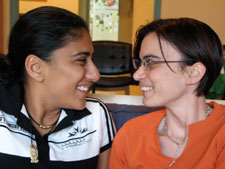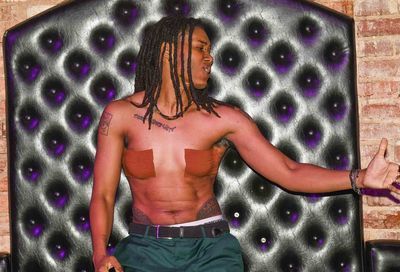City Of Borders
Reel Affirmations 2009
Review by Will O’Bryan
Rating: 



 (5 out of 5) [Critic’s Pick!]
(5 out of 5) [Critic’s Pick!]
Sunday, 10/18/2009, 12:00 PM
Feature presentation, $10 at Cecile Goldman Theater at the DCJCC
English and Arabic with English subtitles

JERUSALEM IS more than a city. Divided by religion, ethnicities, politics and eras, it is where conflict lives. To delve into the city’s GLBT identity might seem odd when there is so much more going on here. Debating the claims on the city by Israelis and Palestinians, or ranking the divine value of the place between Muslims, Jews and Christians, does it really matter if there’s a gay bar?
Yes, it does.
Yun Suh’s City of Borders ensures that there is some record beyond the news accounts of life for gays and lesbians in this city of gods and division, where nothing has been able to unite extremists of Christianity, Judaism and Islam — save for their hatred of gay people.
In Jerusalem, Ravit, a Jewish Israeli partnered with a Palestinian Israeli, Samira, describes that lone gay bar, Shushan, as ”like finding fresh water in the middle of the desert.”
With this couple, Suh’s Jerusalem includes Sa’ar, proprietor of Shushan as well as the city’s first openly gay City Council member. On two sides of the wall, literally, are Boody, a West Bank-residing Palestinian drag queen, and Adam, a young Israeli building his home in a settlement suburb of Jerusalem, who was one of those wounded in the 2005 knife attack on Jerusalem Pride.
We meet and like them all. And Suh shows us how in this divided city, the differences are superficial. Boody’s death threats come from Muslims; Sa’ar’s from Orthodox Jews. Ravit and Samira spar over civil rights in Israel and Palestinian independence, with the Middle East conflict even manifesting itself in their bedroom. It’s the discussion of having children, however, that tears foremost at their relationship.
The only thing missing from the Borders is Jerusalem Open House, the GLBT community center. The absence is conspicuous, though the 12-year-old JOH could likely offer enough material for a separate documentary.
That said, what GLBT audiences may appreciate most about Borders is how it beautifully illustrates that GLBT people are pioneers in bridging these borders that divide the rest of the city. Gay people are shown to still have conflicting views, but the Jewish guy who supports Israeli settlements and the Palestinian who rallies for Palestinian independence have no problem dancing together in the same gay bar.
Along with City of Borders is the short, Le(s)banese, wherein Lebanese-Australian lesbian Alissar Gazal returns to Beirut to find out what life might be like for her counterparts.
For the most part, her short film is a confection. Yes, there is war. Yes, there is the 17-year-old Luby who fears for her own future upon witnessing all the joy at a traditional wedding.
But think of Lebanon’s sweet and luxurious gift to the world, Patchi chocolates. That’s the sort of taste you’ll be left with watching femme Jackie, 22, and butch Stephanie, 20, teasing and talking about cruising women at Dunkin’ Donuts.
Support Metro Weekly’s Journalism
These are challenging times for news organizations. And yet it’s crucial we stay active and provide vital resources and information to both our local readers and the world. So won’t you please take a moment and consider supporting Metro Weekly with a membership? For as little as $5 a month, you can help ensure Metro Weekly magazine and MetroWeekly.com remain free, viable resources as we provide the best, most diverse, culturally-resonant LGBTQ coverage in both the D.C. region and around the world. Memberships come with exclusive perks and discounts, your own personal digital delivery of each week’s magazine (and an archive), access to our Member's Lounge when it launches this fall, and exclusive members-only items like Metro Weekly Membership Mugs and Tote Bags! Check out all our membership levels here and please join us today!




























